
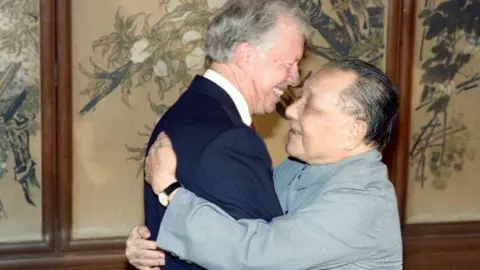 Getty Images
Getty ImagesOn a bright January morning in 1979, then-US President Jimmy Carter welcomed a historic guest to Washington: Deng Xiaoping, the man who opened up China's economy.
Deng, the first leader of Communist China to visit the United States, had arrived the previous evening, amid falling snow and a welcome from the US Vice President and Secretary of State and their spouses.
It was the beginning of a diplomatic relationship that would change the world forever, and paved the way for China's economic rise — and, later, for its competition with the United States.
Establishing official relations with China was among Carter's most prominent legacies, during a turbulent presidency that ended with one term.
Yawei Liu, a close friend of Carter, said he was born on October 1, the same date as the founding of the People's Republic of China, “and he liked to say that it was fate that brought him together with China.”
Even after leaving office, he worked hard to establish a close relationship with the Chinese people, but this was affected by the cooling of relations between Washington and Beijing.
However, he remains one of a small group of American statesmen whom Beijing cherishes for helping bring Communist China out of its isolation in the 1970s.
Beijing expressed its condolences and described Carter as the “driving force” behind the 1979 agreement. But the Chinese Internet went much further, referring to him as “Meirenzhong” or “the good American,” giving him a title once reserved for emperors.
Wuying Beijing
Carter's first encounter with China was in 1949, as the country was experiencing the final convulsions of a bloody, decades-long civil war.
As a young officer in the US Navy, his submarine unit was sent to Qingdao in eastern China. They had to assist Kuomintang forces that were repelling a communist siege imposed by Mao Zedong's army.
A few kilometers behind enemy lines was a Chinese leader named Deng Xiaoping.
When they finally met after decades, it was as leaders of their countries.
It was former US President Richard Nixon and his Secretary of State, Henry Kissinger, who laid the foundation for courting what was then known as Mao's China. With Beijing and Moscow at loggerheads, they sensed an opportunity to alienate the Soviet ally.
But these efforts reached their peak during the era of Carter and Deng, who pushed for deepening relations. For months, the US president sent trusted negotiators to hold secret talks with Beijing.
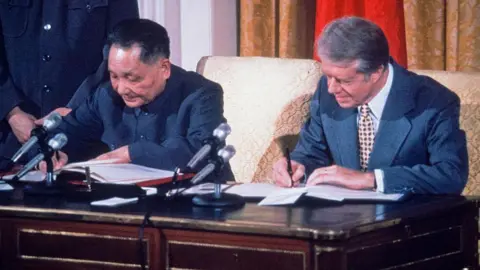 Getty Images
Getty ImagesThe breakthrough came in late 1978. In mid-December, the two countries announced that they would “recognize each other and establish diplomatic relations as of January 1, 1979.”
The world was surprised and Beijing rejoiced, but the island of Taiwan, which had long relied on American support against Chinese claims, was crushed. Carter remains a controversial figure there.
Previously, the United States only recognized the government of Taiwan, Which China considered a rebellious province. For many years, American support for Taiwan has been the sticking point in negotiations.
Shifting recognition to Beijing meant that the United States had finally recognized China's position that there was only one Chinese government — and it was in Beijing. This is it One China policyWhich to this day constitutes the cornerstone of US-China relations.
But this axis raised inevitable questions about the United States’ commitment to its allies. Dissatisfied with Carter's decision, Congress eventually imposed a law codifying its right to supply Taiwan with defensive weapons, creating a permanent contradiction in American foreign policy.
Historians still agree that 1979 signaled an extraordinary set of moves that redirected global power: it not only united the United States and China against the Soviet Union, but it also paved the way for peace and rapid economic growth in East Asia.
A “unique” friendship.
But Carter would not have been able to achieve this without his special relationship with Deng Xiaoping. “It is a pleasure to negotiate with him,” Carter wrote in his memoirs after spending a day with Deng during his visit in January, according to Deng biographer Ezra Vogel.
“The two were following common sense, and there were actually great similarities in their no-nonsense personalities,” said Dali Yang, a political science professor at the University of Chicago. “There was something unique between the two men that really established trust.”
Deng Xiaoping has survived three political purges under Mao to emerge as one of China's most important leaders. Historians attribute the credit for this decisive diplomatic victory to his vision, self-confidence, frankness, and sharp intelligence.
He sensed the opportunity Carter presented, Fogel writes, to thwart Soviet power and to launch a modernization process that had begun in Japan, Taiwan, and even South Korea. He knew that it would evade China without the help of the United States.
Deng's US visit began with a warm first meeting at the White House, where he laughed as he revealed his relationship with Carter in Qingdao, according to Chinese reports. He seemed ecstatic when he clasped hands in front of the cameras in the Rose Garden, saying: “Now our peoples are shaking hands.”
Over the next few days, Deng launched charm attacks on Americans while touring several states with Carter. In one famous photo, Deng appears smiling while wearing a cowboy hat at a rodeo in Texas. A local newspaper headline read: “Deng avoids politics, goes to Texas.”
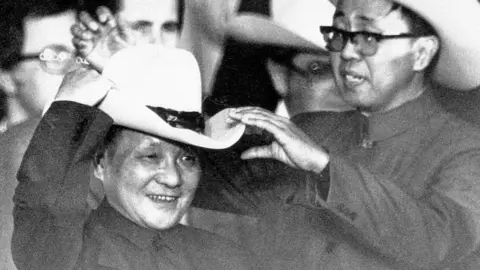 Getty Images
Getty ImagesCarter described Ding as “intelligent, strong, intelligent, outspoken, courageous, personable, confident, and friendly,” according to Vogel.
He later wrote in his memoirs that the trip was “one of the delightful experiences of my presidency… To me, everything went well, and the Chinese leader seemed equally happy.”
“Carter was really the catalyst for what was more than just a diplomatic rapprochement, it was a dramatic moment of signaling,” said Orville Schell, director of the Asian Society's Center on U.S.-China Relations, who as a journalist in 1979 covered the events. Deng's journey.
“He introduced Deng to the country and indeed to the world. He turned that contentious relationship into something very congenial. The way Carter and Deng interacted, those were signals that it was acceptable for both peoples to put history aside and begin a conflict.” A new relationship.”
Under Carter, China was granted “most favored nation” status, which boosted its economy and created jobs. Within a year, bilateral trade between the two countries doubled.
Professor Yang noted that over the next decade, China became an important trading partner not only for the United States but also for the world, which was “extremely important” for China's growth.
Lifelong connection
Carter's relationship with China continued long after the end of his presidency.
In the 1990s, his nonprofit group, the Carter Center, played an important role in China's emerging grassroots democracy, where – at the invitation of the Chinese government – it monitored village elections, trained officials, and educated voters.
Unusually for a former US president, Carter returned to China several times for personal visits. On one trip, he and his wife, Rosalyn, helped build shelters for victims of the 2008 Sichuan earthquake.
His commitment to humanitarian work, his humble background as the son of a peanut farmer, and his “people's style” — which contrasted with the formal public personas of Chinese leaders — endeared him to many Chinese, according to Professor Yang: “He will have to be seen as a role model of a leader.” Who cares, not only in rhetoric but also in actions.”
“Everywhere he traveled in China, people showed their warm feelings toward him… The Chinese people really loved him for his courage and honesty,” said Dr. Liu, a senior adviser at the Carter Center. He has accompanied Carter on several trips, including a 2014 tour where he was welcomed by local and university officials.
In Qingdao, the city held a surprise fireworks display to mark his 90th birthday. In Beijing, Deng's daughter hosted a dinner and gave him a gift — a copy of the People's Daily front page from the 1979 statement. “They were both moved to tears,” Dr. Liu recalls.
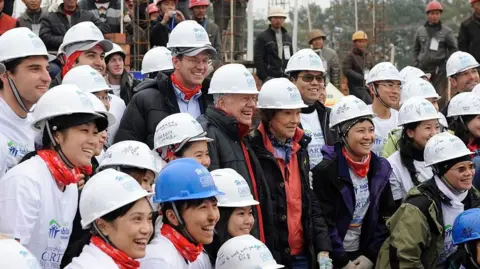 Getty Images
Getty ImagesThis was his last visit. As relations between the United States and China became more tense, so did Carter's relations with the Chinese leadership, especially after Xi Jinping took power.
On the eve of his 2014 visit, senior government officials instructed universities not to sponsor his events, leading to a last-minute scramble to change venues. Carter pointed out.
Schell recalls that the state dinner held for him in the Great Hall of the People in Beijing was attended by only a small number of attendees. Notably, he was hosted by then-Vice President Li Yuanchao, while Xi was said to be hosting another prominent figure elsewhere in the complex.
“He didn't even come to tip his hat to Carter. That really showed the state of the relationship,” Schell said. “Carter was really, really angry. Two of his aides told me he felt like leaving early because he felt disrespected.”
The Carter Center's activities in China were eventually curtailed, and the website they maintained documenting village elections was shut down. No clear explanation was given at the time, but Dr Liu attributed it to China's growing suspicion of foreign organizations in the wake of the 2010 Arab Spring.
Although Carter said little about this snub publicly, it could not have been less pointed, given the lengths to which he advocated engagement.
It also raised questions about whether his human rights approach to China — which he described as “patience” but which others criticized as appeasement — was ultimately justified.
Mr. Schell noted that Carter “often went to great lengths… not to stick his fingers in China's eyes on the issue of human rights.” “He calmed himself down even when he was out of office, as the Carter Center had a real interest in the country.”
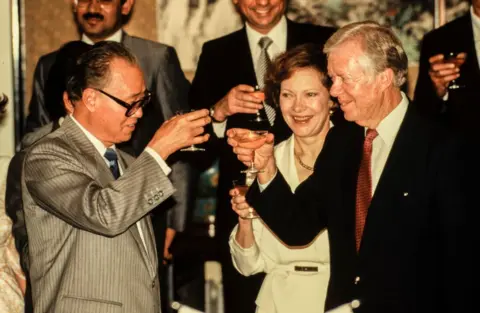 Getty Images
Getty ImagesSome believe that his decision to deal with Communist China stemmed from America's honesty at that time. In the violent aftermath of the Cultural Revolution, there was “a state of disbelief among many Americans: How could the Chinese live in such angry isolation?” Professor Yang said. “There was a real desire among American leaders to really help.”
Others say that the United States, in trying to rally support against the Soviets, set the course for China's rise and ended up creating one of its biggest rivals.
But these measures also benefited millions of Chinese, helping to lift them out of poverty and for a time contributing to expanding political freedom at the local level.
“I think all of us from that generation were children of engagement,” Mr. Shiel said. “We hoped that Carter would find the formula that would slowly bring China into a comfortable relationship with the United States and the rest of the world.”
Toward the end of his life, Carter became more troubled about the growing mistrust between the United States and China, and often warned of the possibility of a “modern Cold War.”
“In 1979, Deng Xiaoping and I knew we were advancing the cause of peace. While today's leaders face a different world, the cause of peace remains just as important.” books On the fortieth anniversary of the normalization of relations.
“(Leaders) must accept our conviction that the United States and China need to build their future together, for the sake of themselves and for the sake of all humanity.”









